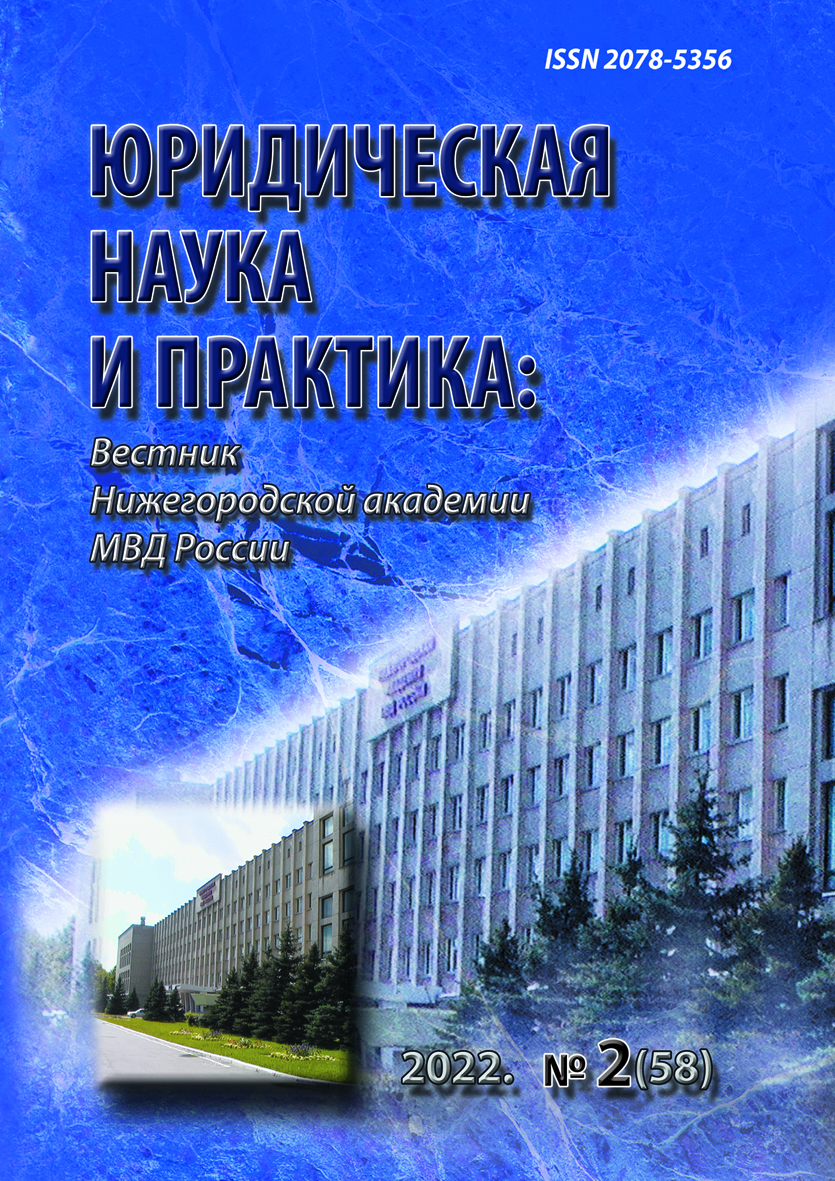Russian Federation
In the article, from the standpoint of a comprehensive understanding of the role of the forensic culture of law enforcement, the methodological prerequisites for the self-determination of forensic knowledge in the structure of criminal law sciences are traced. Law enforcement is considered as a process of restoring justice in public relations, expressed in the movement in the wake of the events of criminal reality, revealing the essence of the trace space and proving the compliance of the traces found with those events that caused damage to people or nature. The important role of the didactic stage in the formation of the forensic culture of law enforcement is emphasized. The complex essence of forensic education is revealed and the didactic means of forming a forensic culture of law enforcement are characterized. A comprehensive understanding of the vision of the trace space of criminal reality is given in relation to the sphere of crime investigation. The didactic stages of the formation of the forensic culture of law enforcement officers through training the ability to structure the criminal reality and its individual manifestations are singled out, and the special didactic tool “primary information comprehension scheme” developed at the Department of Criminalistics of the Nizhny Novgorod Academy of the Ministry of Internal Affairs of Russia is characterized. This didactic tool is considered in the context of the possibility of its use in the operational-combat thinking of an employee of the internal affairs bodies. In situations where the proposed mental algorithm can become the basis for the optimal actions of a police officer in a situation where it is necessary to instantly respond to emerging circumstances during combat contact with the use of various types of weapons and special means.:
forensic culture of law enforcement, didactic tools of forensic education, intellectual means of investigation
1. Alekseev N. N. Fundamentals of the philosophy of law. St. Petersburg, 1998. (In Russ.)
2. Borulenkov Y. P. Object and subject of legal knowledge. Law and law, 2015, no. 7, pp. 22-28. (In Russ.)
3. Tolstik V. A. Conceptual foundations of a normal (fair) state and their constitutional consolidation. Actual problems of economics and law, 2020, vol. 14, no. 1, pp. 186-200. (In Russ.)
4. Tolstik V. A. The concept of normal legal consciousness. Legal Science and Practice: Bulletin of the Nizhny Novgorod Academy of the Ministry of Internal Affairs of Russia, 2021, no. 4 (56), pp. 31-36. (In Russ.)
5. Lubin A. F. Investigation of crimes in the economic sphere: the birth of a scientific school. Legal science and practice: Bulletin of the Nizhny Novgorod Academy of the Ministry of Internal Affairs of Russia, 2021, no. 4 (56), pp. 73-79. (In Russ.)
6. Zhuravlev S. Yu. Some problems of the formation and use of complex didactic models in forensic education. Criminalistics and forensic examinations: science, practice, education. 6th All-Russian Forensic Readings: sat. art. / scientific ed. by M. K. Kaminsky; resp. ed. by A. M. Kaminsky. Izhevsk: Jus est Publ., 2014. Pp. 30-44. (In Russ.)
7. Zhuravlev S. Y., Lapshin, V. E. Forensic means of teaching the methodological and tactical content of the work on the investigation of crimes. Scientific and technical portal of the Ministry of Internal Affairs of Russia, 2019, no. 3 (31), pp. 49-62. (In Russ.)
8. Zhuravlev S. Y. Forensic culture of interdisciplinary anti-corruption training of internal affairs officers. Criminalistics: yesterday, today, tomorrow, 2020, no. 3 (15), pp. 59-67. (In Russ.)
9. Zhuravlev S. Y. Forensic culture of interdisciplinary education. Legal science and practice: Bulletin of the Nizhny Novgorod Academy of the Ministry of Internal Affairs of Russia, 2020, no. 2 (50), pp. 67-72. (In Russ.)
10. Zhuravlev S. Y. Innovative technologies of forensic education as a factor in improving the practice of investigating crimes. Criminalistics: yesterday, today, tomorrow, 2017, no. 3 (3), pp. 31-38. (In Russ.)
11. Zhuravlev S. Y. Forensic style of thinking: methodological content and correlation with a qualification understanding of the events under investigation. Legal Science and Practice: Bulletin of the Nizhny Novgorod Academy of the Ministry of Internal Affairs of Russia, 2018, no. 2 (41), pp. 127-132. (In Russ.)
12. Zhuravlev S. Y. Situational games with the opposition of the parties. Nizhny Novgorod legal notes: a collection of scientific papers / ed. by prof. V. T. Tomina. Nizhny Novgorod: Nizhny Novgorod Higher School of the Ministry of Internal Affairs of the Russian Federation, 1995. Issue 1. Pp. 184-193. (In Russ.)
13. Zhuravlev S. Y. On the essence of forensic thinking in the investigation and its relationship with the qualification understanding of the crime event. Forensic science: yesterday, today, tomorrow, 2018, no. 3 (7), pp. 17-22. (In Russ.)
14. Zhuravlev S. Y. Innovative technologies of forensic education as a factor in improving the practice of investigating crimes. Criminalistics: yesterday, today, tomorrow, 2017, no. 3 (3), pp. 31-38. (In Russ.)
15. Zhuravlev S. Y. Didactic prerequisites and foundations of the concept of a comprehensive exam (professional test) in groups of investigators and interrogators. Legal Science and Practice: Bulletin of the Nizhny Novgorod Academy of the Ministry of Internal Affairs of Russia, 2015, no. 4, pp. 201-205. (In Russ.)
16. Interdisciplinary training as a form of conducting exercises in a specialized university of the Ministry of Internal Affairs of Russia. Educational and methodological manual / ed. by S. Yu. Zhuravlev, S. A. Kuzmenko. N. Novgorod, 2009. 283 p. (In Russ.)












